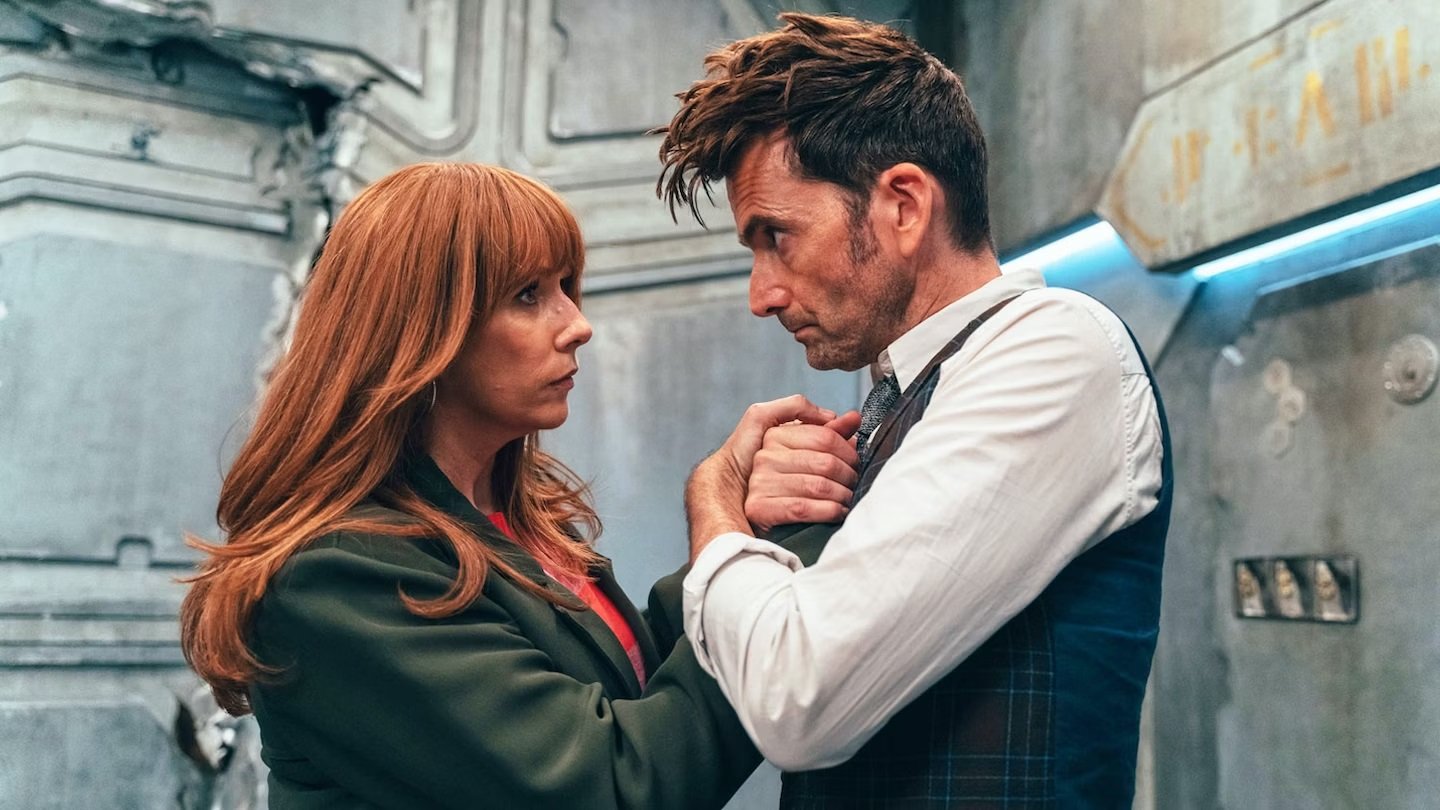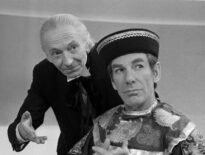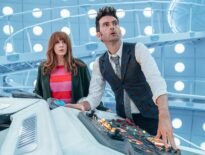As we race towards the end of Doctor Who‘s 60th anniversary, there’s just enough time to ruminate on Wild Blue Yonder, the second episode featuring David Tennant as the Fourteenth Doctor and Catherine Tate as Donna Noble.
Simon Danes largely enjoyed the episode, and, in his review, enthused:
“The aliens were very alien. There was a real sense of otherness about them: unsettling, different, disembodied, drifting on the edge of the void. Doctor Who villains are often pretty straightforward: power-mad nutcases with an inflated sense of their own importance, motivated by a desire to dominate and to blow things up. (And why not?) These two entities, however, were genuinely cruel and disturbing: strip them of their powers, and they’re no more than nasty, spiteful little playground bullies. And superbly realised by the two leading actors. Catherine Tate’s sneer, the horrid teeth (both the prosthetics and the distorted CGI-exaggerated grins), David Tennant’s sophisticated loutishness. Brilliantly done. The way the story was plotted, involving the audience by making them ask what the hell was going on, added to the real sense of menace.”
But what about the rest of the DWC? We found a few of them floating about on the edge of DWC Towers. We gathered a few up in our extensively long arms, and gave them 10 seconds to tell us what they think. Fortunately, those were a very long 10 seconds.
Jason Z
The Doctor: Why did this old face come back?
Donna: Why did this face come back?
Audience: So you could both make a big-budget remake of Midnight!
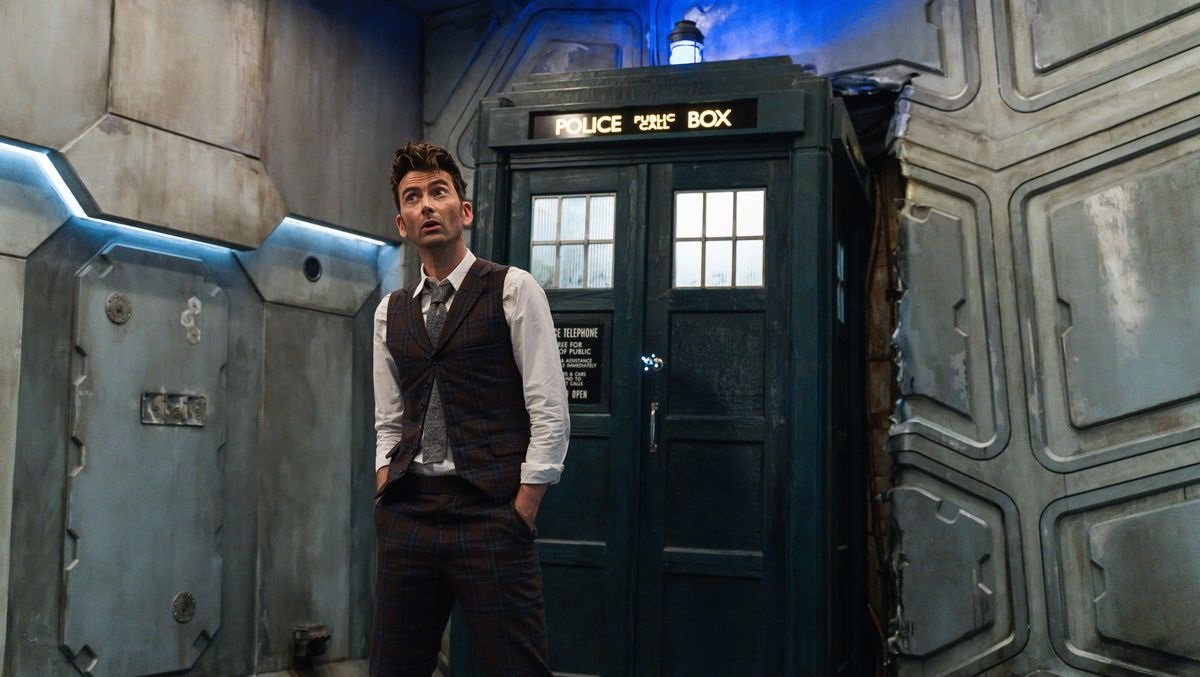
Well, perhaps that isn’t entirely fair. One can also see elements of Doctor Who’s Listen, and John Carpenter’s The Thing and the first Alien film. It’s not really a remake of any of them, but an episode in its own right. Nonetheless, the similarity to Midnight does seem notable.
There was very little known about this episode before it aired, and perhaps this led some to be disappointed that there was no appearance from River Song, the Eighth Doctor, Susan, or similar. Having heard Russell T Davies’ remarks that the episode would be scary, I was expecting an adventure like Blink, which also had a very short, uninformative trailer. And I think the reason was the same: a fuller trailer would have spoiled either episode. How much could have been shown in the trailer for Wild Blue Yonder without undermining the moment when we realise that there are duplicates? I at least thought that the Doctor coming in to see Donna while she was moving spaceship parts about was the real Doctor, albeit one who was suspiciously quick to return. Only at the cut to the next scene was I sure that there were two of each of them. Here, Catherine Tate’s acting was especially good. She needed no words to convey which character she was; it was clear from her face.
I was forbidden to show this episode to my daughter. But it might catch on in school playgrounds anyway. On the following Monday, a schoolmate of my daughter’s told me that she loved Doctor Who, especially “the lady Doctor”. I asked, did she watch the latest one, this weekend? Oh yes, she said; then she looked away from me and into the distance, stretched out her arms, and intoned, slowly droning, “My arms are too long…”
To get back to the episode: I loved it. In fact I thought it better than most of the much-revered Series 4. It didn’t celebrate 60 years of Doctor Who, no, but I’m fine with that. It was an excellent episode of New Who. References to the Timeless Child were done well (despite the latter being an addition to the canon which I, like many, do not find pleasing); these passing acknowledgements are all that’s needed. The last few scenes on the spaceship, when it does look like Donna will be toast, comprised the most tense scene I can ever remember in Doctor Who. It seemed to me that the Doctor decided to pick a Donna at random and then check if he was right once on board the TARDIS, but perhaps that’s not what was intended.
Will Donna make it out alive next time? She’s nearly failed to do so two weeks in a row now…
Andrew Hsieh
After last week’s outstanding opener, the second of the three 60th anniversary specials takes the Fourteenth Doctor and Donna to an extraordinary part of the universe with buried secrets and twists. At times, it was funny. At times, it was terrifying. And I loved it. Gave me vibes of Heaven Sent, Pixar’s WALL-E, and also Mavity — sorry, I mean Gravity, the 2013 space thriller with Sandra Bullock and George Clooney!
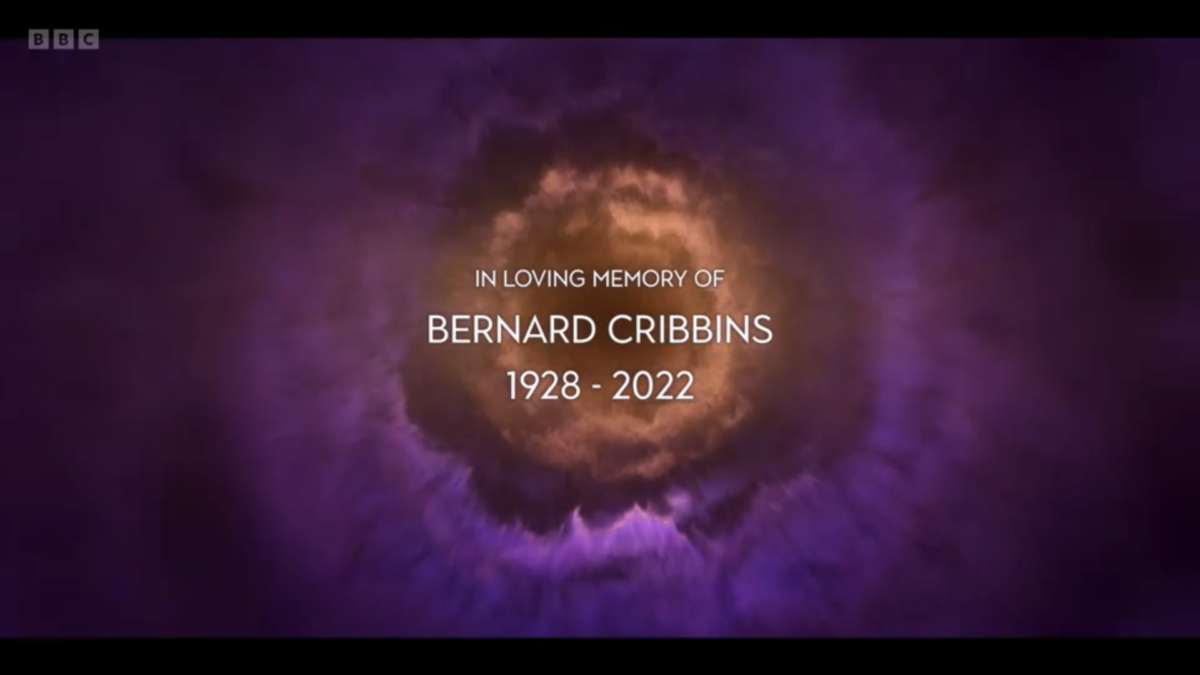
If Wild Blue Yonder couldn’t impress me enough, the ending itself was full of joy and emotions. The return of Wilfred Mott, Donna’s beloved grandfather, played by the late Bernard Cribbins who sadly passed away last year. We all knew that he was coming back for the 60th, but I didn’t expect it to be during the closing minutes, and it was heartbreakingly marvellous. I nearly broke down in tears upon seeing him, especially the dedication in the end credits. But don’t worry, Russell T Davies has reassured us (via Instagram) that Wilf is “safe and sound” after that shocking cliffhanger.
Ida Wood
I wasn’t convinced by the CGI, particularly early on. But the very obviously computer animated background and effects helps distance this episode from a reality we’re familiar with, and would no doubt spark the imagination but also fear of younger viewers. It’s one of the great attributes of Doctor Who that a story can be written that gives adult audiences lots to think about and keeps them on their toes while being flat-out scary for children.
I loved all the scenes in the cockpit, where the pace often slowed down but then the tension built and particularly with the camera angles chosen. Despite the episode taking its title from a song, which was quite easy to miss the first time around it was played, the music did not always feed the drama. Sometimes, it was energetic in a way you could imagine Disney productions would be when it would have been more fitting on a empty spaceship to leave the actors to do the storytelling themselves or have the music be a low background throb.
The dialogue was superb throughout, giving Tennant and Tate lots to do but also some properly funny one-liners. Conversations that looked into the edge of the universe (which they could not literally, since there was no light there yet) were a highlight, and it really had the feel (but not necessarily the look) of some of the big budget science-fiction movies of the early 2010s that emphasised how utterly vast and unknown the universe. That was a time studios sought to use the latest CGI technology for claustrophobic science-fiction thrillers rather than large-scale space wars.

Having to guess which of the Doctors and Donnas were the copies was fun, and I got it wrong twice so maybe it’s my own not-thing copy now writing this review. This felt very much like a thematic sequel to Midnight, so maybe one day Russell T Davies will give us a third act where the Doctor once again faces a villains beyond our understanding of the universe.
Frank Danes
Well, I liked it, really. It was the second of two straightforward episodes where you could actually follow the plot without giving yourself brain ache – so, not like some Moffat episodes (which I loved but which sometimes made my brain hurt) – and where there was actually a story instead of a lot of interesting but undeveloped ideas, jammed together by breathless jump cuts and performances and the pace of a whirling dervish in an attempt to distract the viewer from the holes in the plot (Chibnall). Storytelling is back in Doctor Who. Thank you, Russell.
I thought the opening was a bit slow but imagine this will play better on a second viewing: I get anxious watching Doctor Who first time around because I worry that it might not be any good this week. Loved the first appearance of the beast Doctor and Donna – my family turned to each other and said, “That’s not the Doctor, is it?” – and loved the difficulty of tracking which Doctor or Donna was the genuine article. Liked the special effects and the cute, slow robot, who looked like a rusty Marvin from The Hitchhiker’s Guide to the Galaxy movie.
I imagine the episode was written to give Tennant and Tate a swansong and allow them a showcase for their talents: hence the absence of any supporting cast other than body and contortionist doubles. The Isaac Newton scene had me spitting blood as it contradicted the Doctor’s account of meeting Newton in The Pirate Planet (1978). Did the hint that the Fourteenth Doctor might be gay bother me? Nope, couldn’t give a yard of Rutan slime about that one. It’s just Davies enjoying goading people, as usual.
What I find really disappointing is the Doctor Who Unleashed programme which follows Doctor Who on BBC3. Nothing, for example, about how the doubling effects were achieved but lots about what a fun and lovable guy the presenter is, who is under the misapprehension that viewers want to see his adventures as a trainee cameraman, sound person, or whatever it is, rather than 30 minutes concentrating on how the episode was done. Could someone have a quiet word with him, ask him to take a humility pill, and realise that viewers actually want to see stuff about Doctor Who and not about his crazeee antics? Just a thought.
Rick Lundeen

The era of the Fourteenth Doctor is only two hours old, yet nearly at an end. This was a slow build up, which became a spooky, freaky story of awe and wonder. Russell is going full throttle here, and he’s not looking back. Of course having your two main characters just talking and catching up might not seem like a risky move — but well written, intelligent, and natural conversations are rare these days. And when it’s a Davies, Tennant, and Tate production, you can sit back and enjoy.
When and how (faux) Donna brings up the Flux, in the next couple of minutes, we finally feel the true horror of what the Flux did, and we see the Doctor truly agonizing over the event, far more than we ever did during the previous era. It takes but a moment to legitimize the gravity of the event.
Yes, gravity.
The SFX were interesting, with a mix of practical effects thrown in. I wonder just exactly what that ship was for anyway? Long strolls? Jogging? Escape rooms? No idea, but lovely just the same. Some people nit-pick at the effects, like they do every week. A reminder, Doctor Who doesn’t exist for effects, nor is that what carries the show. The effects are there to help out when possible. After thoughts. Not really even the point of Doctor Who. But I digress.
Speaking of lovely — Wilf! So wonderful to see him one last time. I predicted there’d be tears.
I like that the Doctor was without the TARDIS and sonic.
I honestly didn’t even notice the race change on Newton until it was brought up here, nor did I think we’d even have a comedy cold open, but I guess a light moment was needed before the heavy stuff rolled in.
Russell went in the direction of home, hearth, and oddities last week, eerie deep space paranoia this week, and it looks like next week, absolutely anything goes.
Let’s make it three for three, Russell. And again, as with last week, it’s so good to have proper Doctor Who back.
I’ll try to stop saying that any month now…
Philip Bates
It’s ironic that David Tennant described this episode as unlike any other Doctor Who, given that there were lashings of Midnight, Oxygen, Flatline, The Impossible Planet/ The Satan Pit, The Waters of Mars, and several others; sad, too, that all those episodes were vastly superior to Wild Blue Yonder. Yep, I’m afraid to say that I thought this special was awful.

Don’t get me wrong, there were lots of good ideas behind it — the slow destruction, being on the edge of the universe, experiencing creatures so far removed from what we recognise; I especially liked the revelation about the knocking on the outside of the ship and that lovely visual of the decomposed alien floating in nothingness (although “nothingness” isn’t something we can even picture: here, it was shown as an absence of light, but the very idea of nothing simply doesn’t exist in human thought as everything we can think of — even blackness — is something, so it was a tad disappointing that something smarter wasn’t dreamt up). And the notion of essentially a two-hander with two of the strongest leads this show has ever had was right on the money.
But too much of this episode was embarrassing. Doctor Who does ridiculous well, yet I can’t help but cringe at the thought of less-forgiving casual viewers’ reactions to the supposed body horror elements which look cheap and awkward, and, to my mind, simply didn’t work. I rarely have an issue with the CGI, but this… wasn’t good, simply put. And I think I see what Russell is doing, but having a black Isaac Newton (just so he can get one of his friends in Doctor Who) is beneath the showrunner; I’m predicting that, and “mavity”, are clues about being in a different dimension or something, but that didn’t stop my eyes rolling. Again: embarrassing.
Its biggest crime, however, was being really boring. That shocked me. Tennant and Tate are magnetic and charming; and I’ve not found a Davies script tedious since Love & Monsters: why was this so hard to get through?! I found myself watching the clock and checking my phone. I don’t do that with TV normally, and certainly not with Doctor Who.
Okay, I’m being ground down. Next time, it’s the Toymaker though, and that sounds great. Please, please, please let it be great.
Ah, ending on a bum note there, but most people enjoyed Wild Blue Yonder. Next up: The Giggle, bringing the 60th anniversary celebrations to a close…
